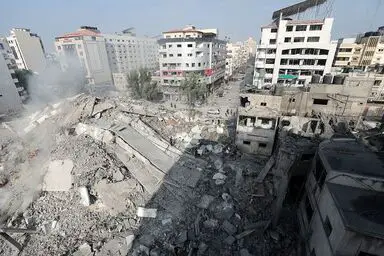
In a recent development, the United States and the United Kingdom have conducted coordinated air strikes on Houthi positions, marking a significant escalation in their military involvement. Despite the increased show of force, the Houthi rebels, who have maintained control over significant portions of Yemen, including the capital, Sanaa, have proven to be resilient. This raises the question: Can military interventions by external powers like the US and UK lead to a resolution of the Red Sea conflict, or is the path to peace paved solely through diplomatic means, such as a Gaza ceasefire?
It also exposed the coalition of 20 countries about which the US was talking about, but only US and UK did the job, other countries does not look interested in escalation of the crisis.
The Houthi movement, has been engaged in an armed conflict with the Yemeni government since 2004. The situation escalated in 2015 when a Saudi-led coalition, backed by the US and UK, intervened to restore the government of President Abdrabbuh Mansur Hadi. This intervention has led to a protracted war, causing one of the world’s worst humanitarian crises.
The recent bombings by the US and UK on Houthi positions were reportedly aimed at crippling the military capabilities of the Houthis and restoring strategic balance. However, the aftermath of such operations suggests a different narrative. Some analysts say that one of the location bombed was the one, which was previously bombed 15 times by Saudis using the American F-15s and American bombs. The resilience of the Houthi forces, despite the heavy bombardments, indicates that a military victory over the group is a far-reaching goal.
The complexity of the Yemeni conflict, with its interwoven layers of local, regional, and international issues, makes it clear that a purely military solution is unattainable. The Houthis have demonstrated not only military robustness but also the ability to govern and provide services in the territories they hold. Their entrenchment is not just military but also political and social.
The continued military campaigns have also taken a severe toll on the civilian population. The United Nations has repeatedly reported on the dire humanitarian situation in Yemen, with millions of people facing acute food insecurity and the collapse of health, water, and sanitation systems. The bombings, despite being targeted at Houthi militants, inadvertently affect civilians due to the dense population and urban warfare tactics.
If even after the attacks on Houthi positions the attacks on cargo ships continues, this was lead to a perpetual cycle of attacks and counter attacks and US will be bogged in another war, ultimately benefiting no-one, but China.
The Military interventions alone are insufficient to ensure victory or to bring about a lasting peace, especially in the context of the Red Sea crisis. The same tactics and weapons were used by the Saudi coalition against Houthis for years but they proved resistant to the same. Nonetheless the inability to achieve a decisive military victory against the Houthi forces is indicative of the complex and entrenched nature of the conflict in Yemen.
Given the intractability of the conflict, the logical step forward would be a ceasefire in Gaza, which the whole world opinion favours except the United States. History has shown that in similar conflicts, ceasefires can serve as the first step towards a more comprehensive peace process.
In conclusion, while the recent US-UK airstrikes on Houthi positions highlight the Western powers’ dedication to a military strategy, the unyielding nature of the Houthi insurgency and the complex dynamics of the Yemeni conflict suggest that a ceasefire in Gaza is the practical solution. A ceasefire would not only alleviate the immediate humanitarian crisis in Gaza but also lay the groundwork for a long term political resolution.
It is imperative for the international community to recognise the limitations of military intervention and to press for a Gaza ceasefire that could usher in a period of negotiation and, ultimately peace via Two-State-Solution




